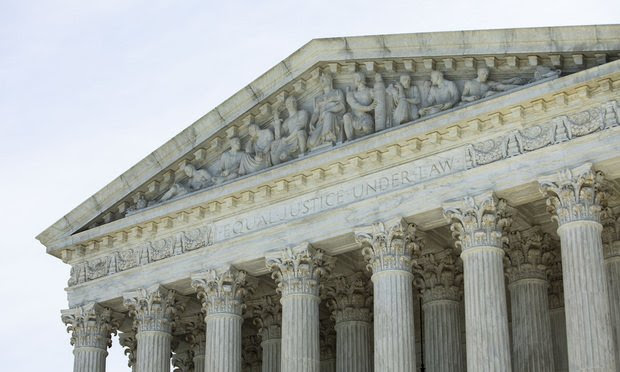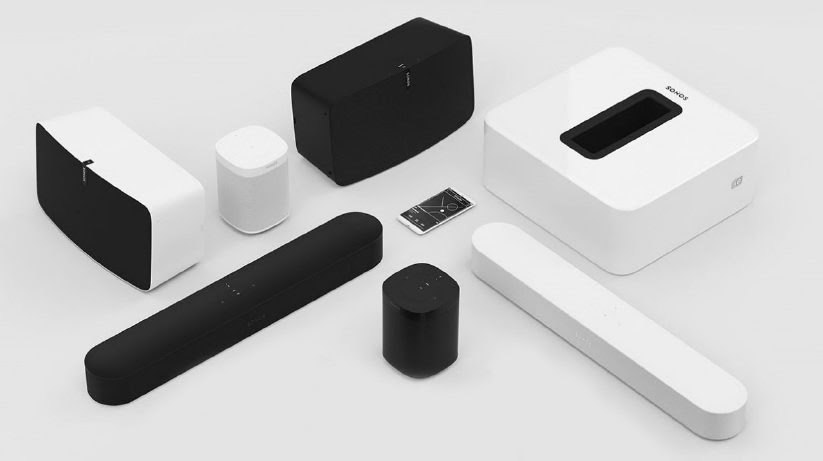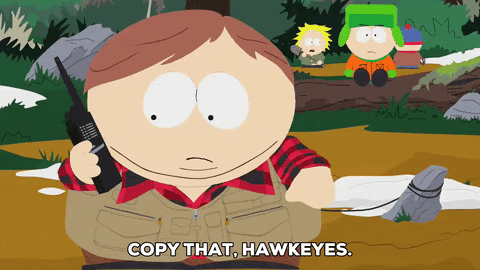Skilled in the Art: All Quiet on Section 101 + Sonos to Hit Replay on Patent Eligibility + Quinn Emanuel's Next Round With Facebook Over Messaging
No action on patent eligibility today at the Supreme Court.
January 10, 2020 at 06:36 PM
7 minute read
Welcome to Skilled in the Art. I'm Law.com IP reporter Scott Graham. Here's what's cooking today:
• No action on patent eligibility today at the Supreme Court.
• Sonos has re-enlisted its Lee Sullivan team and paired it with Orrick for IP showdown with Google.
• Quinn Emanuel picks another patent fight with Facebook, this time for messaging app Voxer.
• Skyy is the limit for spirits maker in trademark fight.
As always, you can email me your feedback and follow me on Twitter.

Supreme Court Sits Tight on Patent Eligibility
It's all quiet on the Section 101 front.
Yeah, too quiet.
The Supreme Court did not issue any orders Friday in the six patent eligibility cases on its conference. We won't know until Monday whether the court denied certiorari or has decided to relist some or all for a future conference.
One small datapoint pointing toward relist: The court on Wednesday asked Sprint Nextel and other phone companies to submit a brief in opposition to certiorari in one of the six cases, Reese v. Sprint Nextel, by Feb. 7.
Petitioner Morris Reese has asked the court to at least hold his case pending review of any of the cases recently spotlighted by the solicitor general's office.
Expectations are higher than usual because the Supreme Court asked for the solicitor general's views in two eligibility cases: Hikma Pharmaceuticals USA v. Vanda Pharmaceuticals and HP v. Berkheimer. The SG told the court last month that a broad review of the court's patent eligibility jurisprudence is in order, but said that Athena Diagnostics v. Mayo Collaborative Services would be the best vehicle.
Those three, plus Reese and two others remain before the court. For now.

Sonos products
Sonos Hopes to Hit Replay on Section 101
The New York Times had a terrific breakdown of the competitive conundrum home audio company Sonos is trying to find its way out of with its patent infringement suit against Google.
Sonos alleged in its Tuesday complaint that it pioneered the wireless multi-room audio system in the early 2000s, but that after partnering with Google Play Music, Google began marketing its own infringing systems. The infringement is "profoundly compounded by Google's business strategy to use its multi-room audio products to vacuum up invaluable consumer data from users," Sonos contends, enabling Google to sell its products as low-cost loss leaders. The case has been assigned to U.S. District Judge John Kronstadt of Los Angeles.
A few additional notes about Sonos' case and its legal team:
➤ The company successfully asserted some of the same patents in Delaware against Denon Electronics and its parent D&M Holdings. Sonos is calling on the same legal team—George Lee, Sean Sullivan, Rory Shea and J. Dan Smith of Lee Sullivan Shea & Smith—and is pairing them with Orrick Herrington & Sutcliffe partners Clement Roberts and Alyssa Caridis. Sonos' legal department is helmed by GC Eddie Lazarus, author of the 1998 behind-the-scenes look at the Supreme Court Closed Chambers. He served as GC of Tribune Media before joining Sonos a year ago.
➤ Section 101 was a key battleground in the Delaware litigation and Google will likely try a similar attack. Sonos' 8,588,949 patent, for example, claims a controller that provides a user interface allowing for the formation and control of zone players. Denon argued the patent was directed to the abstract idea of controlling audio settings for multiple devices. But U.S. District Judge Richard Andrews said that was an oversimplification that ignored "tangible limitations that are tied to specific devices." Sonos eventually won a $2 million verdict and settled the case during post-trial motions.
➤ Sonos went public in August 2018. In its S-1, it dutifully cautioned that "we have initiated legal proceedings to protect our intellectual property rights, and we may file additional actions in the future." The company specifically highlighted its litigation with Denon. But it didn't mention that it was getting crosswise with the world's fourth-largest technology company. Now we know from Sonos' complaint that as early as October 2016, "Sonos put Google on notice of infringement of 28 Sonos patents," and that "later in January 2018, and then again in July 2018, Sonos put Google on notice of infringing even more Sonos patents." There may not have been any legal obligation to disclose all that, but it sure seems like information that would have been helpful for prospective investors.

Quinn Emanuel Hits Facebook Again Over Messaging
For walkie-talkie app Voxer, the best defense has always been a good offense. When IPVX Patent Holdings sued the company in the Eastern District of Texas in 2012, Voxer's San Francisco-based parent company got the case transferred to Northern California and ultimately won an $820,000 fee award. Uniloc USA sued Voxer in ED-Tex in 2016, but settled after Voxer again moved for transfer to California.
Now Voxer is taking the initiative as patentee—and Texas suddenly looks more appealing. It's suing Facebook and Instagram in the Western District of Texas, alleging infringement of patents related to live video messaging. Voxer is backed by Quinn Emanuel Urquhart & Sullivan, which has brought similar patent litigation against Facebook on behalf of BlackBerry.
Voxer has a great story to tell a jury if the case gets that far. According to the complaint, co-founder Tom Katis was a Special Forces communications sergeant deployed to Afghanistan in 2003, where he coordinated medevac, tactical reinforcements and close air support under enemy fire. The experience impressed upon him the shortcomings of existing communication systems and led to the development of the Voxer walkie talkie.
Quinn Emanuel partners Kate Kaufmann Shih, Kevin Johnson, Robert Stone and Sam Stake are representing Voxer. No word yet on Facebook, though it sounds like another job for regular patent litigation counsel Cooley.

Going Nuclear Over Trademark Rights
Two Navy veterans are at the center of a trademark fight with a leading U.S. spirits maker.
Chase Baron and Sean Smith met on the U.S.S. Rhode Island nuclear-powered submarine 15 years ago. In 2018 they went into the roofing business together in Colorado and named their company Skyyguard Corp.
Campari America LLC, the company that markets Skyy brand vodka, didn't think it was cool. Campari has retained Greenberg Traurig and is opposing the roofers' attempt to register Skyyguard with the PTO. Campari says it's invested hundreds of millions in advertising and promoting its famous SKYY mark, and it doesn't want even a local, non-spirits company diluting it.
Westword.com has details of the dispute, which the roofers describe as a case of trademark bullying.
So far the parties have been fighting over thousands of pages of discovery that Campari has designated as attorneys eyes only. The roofers argue that they've signed protective orders, don't compete in the spirits industry, and have held high Defense Department security clearances, so they can be trusted with brand-tracking reports and expert surveys. Campari says the documents are "highly confidential, commercially sensitive," and the roofers' attorney can describe them without disclosing details.
Baron and Smith are represented by Terrence Wyles of Aurora, Colorado's, Startup IP Law. Campari is represented by Greenberg Traurig of counsel Sabina Vayner.
That's all from Skilled in the Art this week. I'll see you all again on Tuesday.
This content has been archived. It is available through our partners, LexisNexis® and Bloomberg Law.
To view this content, please continue to their sites.
Not a Lexis Subscriber?
Subscribe Now
Not a Bloomberg Law Subscriber?
Subscribe Now
NOT FOR REPRINT
© 2025 ALM Global, LLC, All Rights Reserved. Request academic re-use from www.copyright.com. All other uses, submit a request to [email protected]. For more information visit Asset & Logo Licensing.
You Might Like
View All
Skilled in the Art With Scott Graham: I'm So Glad We Had This Time Together

Design Patent Appeal Splinters Federal Circuit Panel + Susman Scores $163M Jury Verdict + Finnegan Protects Under Armour's House
Law Firms Mentioned
Trending Stories
- 1'It's Not Going to Be Pretty': PayPal, Capital One Face Novel Class Actions Over 'Poaching' Commissions Owed Influencers
- 211th Circuit Rejects Trump's Emergency Request as DOJ Prepares to Release Special Counsel's Final Report
- 3Supreme Court Takes Up Challenge to ACA Task Force
- 4'Tragedy of Unspeakable Proportions:' Could Edison, DWP, Face Lawsuits Over LA Wildfires?
- 5Meta Pulls Plug on DEI Programs
Who Got The Work
Michael G. Bongiorno, Andrew Scott Dulberg and Elizabeth E. Driscoll from Wilmer Cutler Pickering Hale and Dorr have stepped in to represent Symbotic Inc., an A.I.-enabled technology platform that focuses on increasing supply chain efficiency, and other defendants in a pending shareholder derivative lawsuit. The case, filed Oct. 2 in Massachusetts District Court by the Brown Law Firm on behalf of Stephen Austen, accuses certain officers and directors of misleading investors in regard to Symbotic's potential for margin growth by failing to disclose that the company was not equipped to timely deploy its systems or manage expenses through project delays. The case, assigned to U.S. District Judge Nathaniel M. Gorton, is 1:24-cv-12522, Austen v. Cohen et al.
Who Got The Work
Edmund Polubinski and Marie Killmond of Davis Polk & Wardwell have entered appearances for data platform software development company MongoDB and other defendants in a pending shareholder derivative lawsuit. The action, filed Oct. 7 in New York Southern District Court by the Brown Law Firm, accuses the company's directors and/or officers of falsely expressing confidence in the company’s restructuring of its sales incentive plan and downplaying the severity of decreases in its upfront commitments. The case is 1:24-cv-07594, Roy v. Ittycheria et al.
Who Got The Work
Amy O. Bruchs and Kurt F. Ellison of Michael Best & Friedrich have entered appearances for Epic Systems Corp. in a pending employment discrimination lawsuit. The suit was filed Sept. 7 in Wisconsin Western District Court by Levine Eisberner LLC and Siri & Glimstad on behalf of a project manager who claims that he was wrongfully terminated after applying for a religious exemption to the defendant's COVID-19 vaccine mandate. The case, assigned to U.S. Magistrate Judge Anita Marie Boor, is 3:24-cv-00630, Secker, Nathan v. Epic Systems Corporation.
Who Got The Work
David X. Sullivan, Thomas J. Finn and Gregory A. Hall from McCarter & English have entered appearances for Sunrun Installation Services in a pending civil rights lawsuit. The complaint was filed Sept. 4 in Connecticut District Court by attorney Robert M. Berke on behalf of former employee George Edward Steins, who was arrested and charged with employing an unregistered home improvement salesperson. The complaint alleges that had Sunrun informed the Connecticut Department of Consumer Protection that the plaintiff's employment had ended in 2017 and that he no longer held Sunrun's home improvement contractor license, he would not have been hit with charges, which were dismissed in May 2024. The case, assigned to U.S. District Judge Jeffrey A. Meyer, is 3:24-cv-01423, Steins v. Sunrun, Inc. et al.
Who Got The Work
Greenberg Traurig shareholder Joshua L. Raskin has entered an appearance for boohoo.com UK Ltd. in a pending patent infringement lawsuit. The suit, filed Sept. 3 in Texas Eastern District Court by Rozier Hardt McDonough on behalf of Alto Dynamics, asserts five patents related to an online shopping platform. The case, assigned to U.S. District Judge Rodney Gilstrap, is 2:24-cv-00719, Alto Dynamics, LLC v. boohoo.com UK Limited.
Featured Firms
Law Offices of Gary Martin Hays & Associates, P.C.
(470) 294-1674
Law Offices of Mark E. Salomone
(857) 444-6468
Smith & Hassler
(713) 739-1250










